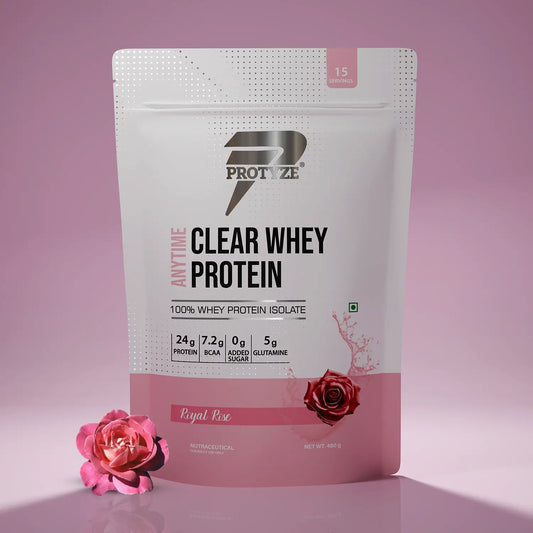Protein shakes are a staple for fitness enthusiasts, offering a convenient way to fuel muscle recovery, support weight goals, and boost nutrition. A common question when preparing a shake is whether to mix your protein powder with milk or water. This choice impacts taste, nutrition, digestion, and overall effectiveness, making it more than a matter of preference.
This blog will explores the real differences between milk and water in your protein shake, covering nutritional profiles, benefits, drawbacks, and practical considerations to help you decide what’s best for your goals. We’ll also highlight Protyze Diet Clear Whey, a low-calorie, probiotic-enhanced protein powder, to illustrate how water-based shakes can optimize your nutrition.
Why the Mixing Liquid Matters
The liquid you choose for your protein shake affects its calorie content, nutrient profile, texture, and digestibility. Milk (dairy or plant-based) adds creaminess, extra nutrients, and a richer flavor, but it also increases calories and may cause digestive issues for some. Water keeps the shake light, low-calorie, and easy to digest, making it ideal for quick absorption or sensitive stomachs. Your choice depends on your fitness goals (muscle gain, fat loss, or general health), dietary needs, and lifestyle factors like workout timing or digestive comfort. Understanding these differences ensures your protein shake aligns with your wellness objectives.
Nutritional Breakdown: Milk vs. Water
Mixing with Milk
Milk, whether dairy (cow’s milk) or plant-based (almond, soy, oat), adds significant nutrients to a protein shake. Here’s a typical profile for 200ml (about 1 cup) of common milk types:
- Cow’s Milk (Whole): ~120 kcal, 8g protein, 10g carbs, 7g fat, 300mg calcium, vitamins A and D.
- Cow’s Milk (Skim): ~70 kcal, 8g protein, 10g carbs, 0g fat, 300mg calcium.
- Almond Milk (Unsweetened): ~30 kcal, 1g protein, 1g carbs, 2g fat, 200mg calcium (fortified).
- Soy Milk (Unsweetened): ~80 kcal, 7g protein, 4g carbs, 4g fat, 200mg calcium (fortified).
When mixed with 25g of protein powder (e.g., whey isolate, ~100 kcal, 20g protein), milk increases the shake’s total calories (150-240 kcal), protein (21-28g), and adds carbs, fats, and micronutrients like calcium, which supports bone health.
Mixing with Water
Water is calorie-free and nutrient-neutral, contributing no additional macros or micros to the shake. Using 200ml of water with 25g of protein powder keeps the shake at ~100 kcal and 20g protein, with minimal carbs or fats. This makes water ideal for those prioritizing low-calorie intake or rapid digestion, as it doesn’t slow the protein’s absorption.
Key Comparison
- Calories: Milk adds 30-120 kcal; water adds 0 kcal.
- Protein: Milk boosts protein by 1-8g; water adds none.
- Carbs/Fats: Milk contributes 1-10g carbs and 0-7g fats; water contributes none.
- Micronutrients: Milk provides calcium, vitamins; water offers none.
- Digestion: Milk may slow digestion due to fats and lactose; water allows faster absorption.
Benefits and Drawbacks of Milk in Protein Shakes
Benefits of Milk
- Enhanced Nutrition: Milk adds protein, calcium, and vitamins, making the shake a more complete meal replacement, ideal for muscle gain or post-workout recovery.
- Creamy Texture and Taste: Milk creates a thicker, richer shake, improving palatability, especially for flavored powders like chocolate or vanilla.
- Sustained Energy: The carbs and fats in milk provide a slower-release energy source, suitable for pre-workout shakes or snacks.
- Bone Health Support: Calcium and vitamin D in milk (300mg per 200ml in cow’s milk) promote bone strength, beneficial for active individuals.
Drawbacks of Milk
- Higher Calories: Milk increases calorie content (150-240 kcal per shake), which may hinder fat loss goals for those in a calorie deficit.
- Digestive Issues: Lactose in cow’s milk can cause bloating or discomfort for lactose-sensitive individuals, affecting ~30-50% of adults globally.
- Slower Digestion: Fats and proteins in milk slow absorption, less ideal for immediate post-workout recovery when rapid protein uptake is desired.
- Cost and Convenience: Milk is pricier than water and requires refrigeration, making it less portable for gym or travel settings.
Best Scenarios for Milk
- Muscle gain or bulking, where extra calories and nutrients are needed.
- Pre-workout shakes for sustained energy.
- Meal replacements when aiming for a nutrient-dense option.
Benefits and Drawbacks of Water in Protein Shakes
Benefits of Water
- Low-Calorie Option: Water keeps the shake at ~100 kcal, perfect for fat loss or maintaining a calorie deficit without sacrificing protein intake.
- Fast Digestion: Water allows rapid protein absorption, ideal for post-workout recovery when muscles need amino acids quickly.
- Digestive Comfort: Water is lactose-free and fat-free, minimizing bloating or discomfort, especially for sensitive stomachs. Protyze Diet Clear Whey, with its 99% lactose-free, probiotic-enhanced formula, pairs well with water for a gut-friendly shake.
- Convenience and Cost: Water is free, accessible, and portable, requiring no preparation or storage.
Drawbacks of Water
- Less Flavor and Texture: Water produces a thinner, less creamy shake, which may feel less satisfying for some, especially with unflavored powders.
- No Added Nutrients: Water lacks the protein, calcium, or vitamins provided by milk, making the shake less nutritionally robust.
- Limited Energy Source: Without carbs or fats, water-based shakes may not sustain energy for long, less suitable for pre-workout or meal replacement.
- Taste Variability: Some protein powders taste better with milk’s sweetness, and water may highlight any artificial flavors.
Best Scenarios for Water
- Fat loss or weight management, where low calories are prioritized.
- Post-workout recovery for fast protein absorption.
- Lactose sensitivity or digestive concerns requiring a light shake.
Practical Considerations for Choosing Milk or Water
Your choice between milk and water depends on your goals, dietary needs, and lifestyle. Here are key factors to consider:
- Fitness Goals: For muscle gain, milk’s extra calories and protein are beneficial; for fat loss, water’s low-calorie profile is ideal. Protyze Diet Clear Whey (15g protein, ~60 kcal, Juicy Mango flavor) with water supports weight management and gut health.
- Digestive Health: If you experience bloating with dairy, water is better, especially with a 99% lactose-free powder like Protyze Diet Clear Whey, which includes probiotics to ease digestion.
- Workout Timing: Use water post-workout for quick absorption; milk pre-workout or as a snack for sustained energy.
- Taste Preference: If you prefer creamy shakes, milk enhances flavor; if you like light, refreshing shakes, water works with fruit-flavored powders like Juicy Lychee.
- Convenience: Water is easier for on-the-go shakes at the gym or office; milk suits home-prepared shakes.
- Example Use: Mix Protyze Diet Clear Whey with 200-300ml water post-workout for a low-calorie (~60 kcal), gut-friendly shake that delivers 15g protein without digestive strain.
Balancing Protein Shakes with Your Diet
To maximize the benefits of your protein shake, integrate it into a balanced diet:
- Protein Needs: Aim for 1.2-2.0g/kg body weight (85-140g for 70kg) from shakes and foods like eggs, chicken, or tofu to support muscle health.
- Calorie Control: Use water-based shakes for fat loss (~500 kcal deficit); milk-based for bulking (~500 kcal surplus).
- Nutrient Variety: Pair shakes with whole foods like fruits, vegetables, and whole grains for vitamins and fiber.
- Gut Health: Probiotics support digestion, especially if milk causes discomfort. Protyze Diet Clear Whey’s probiotic formula enhances gut balance when mixed with water.
- Hydration: Drink 2.5-3L water daily to support metabolism and recovery, regardless of mixing liquid.
Conclusion
The choice between milk and water in your protein shake hinges on your goals, digestive needs, and lifestyle. Milk offers a creamy, nutrient-dense shake with extra protein, calcium, and sustained energy, ideal for muscle gain or meal replacements, but its higher calories and potential for bloating may not suit everyone.
Water keeps shakes low-calorie, fast-digesting, and gut-friendly, perfect for fat loss, post-workout recovery, or lactose sensitivity. Protyze Diet Clear Whey, with its 15g protein, low-calorie, probiotic-enhanced, 99% lactose-free formula, shines with water for a light, effective shake that supports weight management and digestion. By aligning your mixing liquid with your needs, you can optimize your protein shake’s benefits and fuel your 2025 fitness journey!





